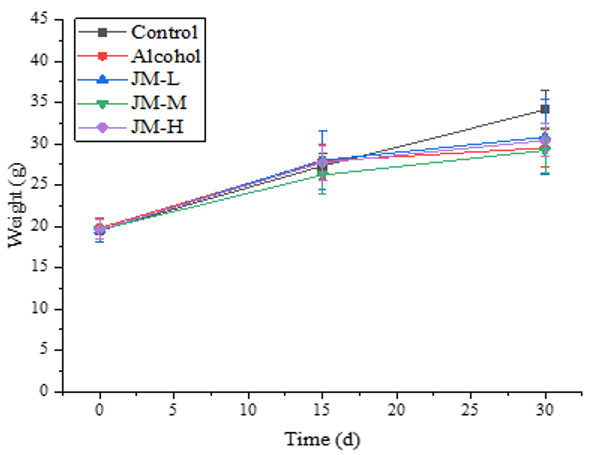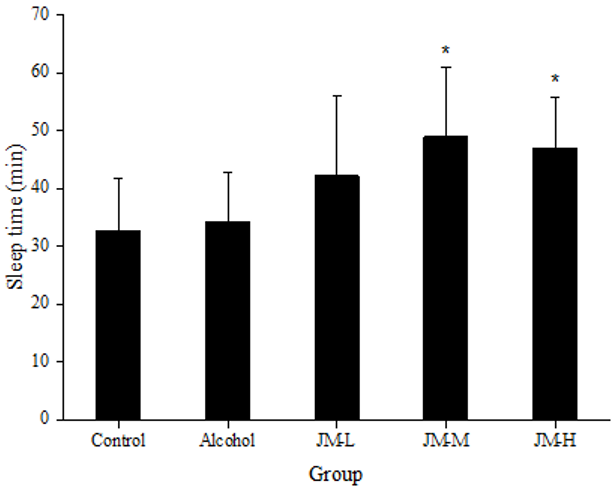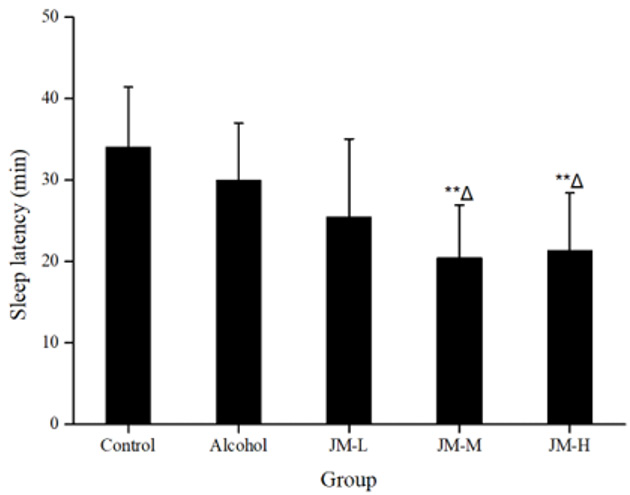Experimental Study on the Effect of Traditional Chinese Medicineliqueur on Sleep Improvement
Research Article
Sleep is an essential activity in human beings to maintain normal physiological function [1]. It is the phenomenon of the body’s periodic rest, and it is an active and complex physiological state necessary for life activities [2]. Through sleep, tired nerve cells can restore their normal physiological functions, and at the same time mental and physical strength are restored accordingly. However, due to the accelerated pace of social life and work, increased psychological pressure, and environmental factors, different groups of insomnia have a high incidence of insomnia, which has a negative impact on people’s physical and mental health [3-5]. Approximately 10–15 % of people worldwide suffer from insomnia, and approximately 25–35 % have transient or occasional insomnia [6]. These cases are attributed to increases in life pressures and the effects of various diseases [7]. Because the mechanism of sleep disorders is complex and involves the physiological regulation of multiple systems such as human nerves and endocrine systems, drug therapy is the most direct and effective method [8]. The drugs used to treat insomnia mainly include barbiturates, benzodiazepines and non-benzodiazepines [9,10]. However, the current main treatment drugs for insomnia have many side effects and adverse reactions, which are not conducive to long-term use [11]. Therefore, natural Chinese herbal medicines with fewer adverse reactions are getting more and more attention, and the development of safe, effective and less side-effect Chinese herbal medicines and functional food has become a very promising solution [8].
Chinese herbal medicine, originating from ancient China, has been used to treat insomnia for >2000 years in China [12,13]. The central nervous system depressant action of some of flavonoid glycosides such hesperidin, naringin and rutin in mice wasre ported [14]. The activity of terpenoids on central nervous system related to their sedative and anxiolytic actions was reviewed and reported [15]. It was reported that salidroside can enhance the sleep of mice by shortening the sleep latency and prolonging sleep time [16]. Studies have shown that schisandra, jujube seed, and yejiaotengand other medicinal materials have the effect of improving sleep [11,17- 19]. We extract the effective ingredients from traditional Chinese medicinal materials such as astragalus, wolfberry, schisandra, ginseng, polygonatum, shouwu, jujube seed, yejiaoteng and other traditional Chinese medicinal materials to make a health Chinese herbal liquer (Jinmian-liquer) with an alcohol content of 25% (v/v). The formula mechanism is to nourish the heart and calm the nerves to improve sleep. The purpose of this study is to use animal experiments to verify the efficacy of Jinmian-liquer in improving sleep.
Material and Methods
Samples
The Chinese herbal liquer (Jinmian-liquer) was produced by Jin Brand Co., Ltd. The recommended intake of Jinmian-liquer for adults is 100ml/d. Based on an adult’s 60kg body weight, the recommended intake of human body can be converted into 1.67ml/kg.bw per day. During the experiment, the concentrated solution was mixed with absolute ethanol to prepare different doses of application solution for intragastric administration. In each experiment, the final concentration of alcohol was 15 degrees. Pentobarbital sodium was produced by China National Pharmaceutical Group Shanghai Chemical Reagent Company. Sodium barbital was produced by Zibo Chemical Reagent Factory.
Experimental Animal
Two hundred SPF male Kun Ming (KM) mice (18–22 g) were provided by the Hubei Experimental Animal Research Center.
Direct Sleep Experiment
Fifty mice were randomized into five groups: control group (distilled water), alcohol group (15% ethanol), andJinmian-liquer low/middle/high dose groups (JM-L/JM-M/JM-H). The three dose groups were prepared at 10/20/30 times the recommended intake of the human body (16.7, 33.3, 50.0ml/kg.bw). The test substance was given by oral gavage, and the gavage volume was 0.2ml/10g. bw. The control group was given the same volume of distilled water, and the alcohol group was given the same volume of alcohol(alcohol content of15% (v/v). The disappearance and recovery of the righting reflex in dorsal position mice were used as indicators to determine sleep and wakefulness, and the time from disappearance of the righting reflex to recovery was the sleep time of the mice [10]. The number of mice falling as leep and the corresponding sleep time of each group were recorded.
Extending Pentobarbital Sodium Sleep Time Experiment
Animal grouping and administration method are the same as above, and once a day for 30 consecutive days. 15 minutes after the last gavage, intraperitoneal injection of sodium pentobarbital 53mg/kg.bw. Then the righting reflex disappeared in dorsal position mice and recovery was the judgment index, and the sleep time of mice in each group was recorded.
Hypnotic Experiment of Pentobarbital Sodium Subthreshold Dose
Animal grouping and administration methods are the same as above, once a day for 30 consecutive days.15 minutes after the last gavage, intraperitoneal injection of pentobarbital sodium 38mg/ kg.bw. The righting reflex disappeared in dorsal position mice One minute or more was the judgment index. The number of mice falling asleep within 30 minutes of each group was recorded, and the falling asleep rate was calculated.
Barbital Sodium Sleep Latency Experiment
Animal grouping and administration method are the same as above, once a day for 30 consecutive days, 15 minutes after the last gavage, intraperitoneal injection of barbital sodium 365mg/kg.bw, the righting reflex disappeared and the mice in dorsal position Revert to the judgment index and record the sleep latency of each group of mice.
Statistics and Analysis
During the experiment, the animal weight, sleep time and sleep latency were tested for the homogeneity of variance, and then the analysis of variance (F test) and pairwise comparison (Q test) were performed. The sleep rate was tested by X 2 test.
Results
The Effect of Jinmian-liquer for Improving Sleep on the Body Weight of Experimental Animals
The results of animal feeding for 30 days (Figure 1) showed that there was no significant difference in the body weight of the mice in each group during the experiment, indicating that the administration of Jinmian-liquer had no effect on the normal growth of the mice.
Direct Sleep Experiment
After the mice in each group were given the control substance and different doses of the test substance, their behaviors and activities were normal, and there was no direct sleep phenomenon, indicating that the Jinmian-liquer has no direct hypnotic effect.
Extending Pentobarbital Sodium Sleep Time Experiment
The method of pentobarbital induced sleeping in mice is a classic pharmacological experiment for screening sedative and hypnotic drugs [20,21]. Mice in each group were given control substances or different doses of Jinmian-liquer for 30 days, and 53mg/kg.bw of sodium pentobarbital was injected intraperitoneally to induce sleep. The sleep time of mice in each group is shown in Figure 2. The results showed that compared with the control group (32.7±9.0 min) and the alcohol group (34.3±8.6 min), the Jinmian-liquer had the effect of prolonging the sleep time induced by pentobarbital sodium, and the sleep time in the middle-dose group (49.0±12.0 min) and the high-dose group (47.0±8.9 min) was significantly longer than that of control group and alcohol group, and the difference was significant (P<0.05).
Figure 2: The effect of Jinmian-liquer on the sleep time of mice induced by pentobarbital sodium ( ±SD), n=10, *P<0.05 compared with the control group.
Hypnotic Experiment of Pentobarbital Sodium Subthreshold Dose
Mice in each group were given control or different doses of Jinmian-liquer for 30 days and intraperitoneal injection of pentobarbital sodium 38 mg/kg.bw at a sub hypnotic dose. The falling asleep rate of the animals is shown in Table 1. The results showed that after the mice were given different doses of Jinmianliquer, the hypnotic fall asleep rate of pentobarbital sodium was not significantly different from that of the control group and the alcohol group (P>0.05), indicating that Jinmian-liquer has no direct effect.
Barbital Sodium Sleep Latency Experiment
Mice in each group were given control substances or different doses of Jinmian-liquer for 30 days, and intraperitoneal injection of barbital sodium 365mg/kg.bw to induce sleep. The incubation period for mice in each group to enter sleep is shown in Figure 3. The results showed that the sleep latency of the control group and the alcohol group were 34.0±7.4 min and 29.9±7.1 min. The administration of Jinmian-liquer can shorten the sleep latency, and the sleep latency of the middle-dose and high-dose groups were shortened to 20.4±6.5 min and 21.3±7.1min, compared with the control group and the alcohol group, the difference was significant (p<0.05).
Figure 3: The effect of Jinmian-liquer on the sleep latency of mice induced by barbital sodium (x − ±SD), n=10, **p<0.01 compared with the control group, p<0.05 compared with the alcohol group.
Discussion
Sleep is a rhythmic physiological process that is regulated by many mechanisms in the body; the pathogenesis of sleep disorders is complex, involving the self-regulation and feedback functions of the body’s nervous, endocrine, immune and other systems [22]. Insufficient sleep duration because of work, societal and family obligations, or sleep disorders such as insomnia or sleep apnea are associated with impaired cognition and negative health outcomes, including mood, cardiovascular, immune, and metabolic disorders [23,24]. The ideal plan for the treatment of insomnia should involve a comprehensive treatment of psychology, behavior and drugs to eliminate factors that interfere with normal sleep [25]. Chemically synthesized sedative and hypnotic drugs are mainly used to shorten the second phase of slow wave sleep (SWS2) and rapid eye movement sleep (REMS) in the sleep phase to varying degrees, and relatively extend the first phase of slow wave sleep (SWS1) to achieve prolongation The effect of total sleep time, but after continuous medication, symptoms such as dizziness, hangover, and drowsiness are prone to occur. Prolonged use may cause dependence and addiction, and many adverse reactions such as rebound and withdrawal symptoms occur when the drug is stopped.
Traditional Chinese medicine theory believes that insomnia is caused by internal and external factors that cause dysfunction of the body’s qi, blood, yin and yang, and viscera. Therefore, treatment should focus on the regulation of internal organs, so that qi and blood can be harmonized, yin and yang are balanced, and visceral functions are returned to normal. Natural plant-derived traditional Chinese medicine prescriptions have received more and more attention due to their multiple targets, good curative effect, and fewer adverse reactions [26]. This effectively disperses pathogens and alleviates mental depression, soothes the liver, regulates the spleen, and exhausts the stagnation of Qi and blood. According to TCM clinical observations, the stagnation of liver-Qi induces insomnia and accounts for more than 80% of the total insomnia cases [20].
Although some prescriptions for improving sleep have been proven to be effective, they are still effective due to decoctions. Factors such as bitter taste, and difficulty in taking the medicine are difficult to be accepted by patients. Health liquer is a traditional Chinese medicine liquer made with digital extraction technology based on the concept of the same source of medicine and food. It uses the principle of “alcohol to aid medicine” to reduce the concentration and dosage of crude drugs, and it has been carefully blended to improve the taste and comfort after drinking. Is a more suitable pharmaceutical dosage form. This study performed the direct hypnotic effect of the wine according to the method of improving sleep function, the synergistic effect of the subthreshold dose of pentobarbital sodium to fall asleep rate, the synergistic effect of the upper threshold dose of pentobarbital sodium to prolong sleep time and the upper threshold dose of barbital Sodium shortens sleep latency and four sleep-improving indicators for functional evaluation. The experimental results show that the wine can significantly shorten the latency of mouse barbital sodiuminduced sleep and prolong the sleep time induced by pentobarbital sodium, suggesting that the test substance is compatible with Sodium barbital and sodium pentobarbital have obvious synergistic effects. Human clinical experiments have also confirmed that health foods that can shorten the time to fall asleep and extend the duration of sleep have the effect of improving sleep efficiency and improving daytime functions after awakening.
In this experiment, the Jinmian-liquer has no direct sleepinducing effect on mice under the amount of reagent, and has little effect on the hypnotic effect of pentobarbital sodium subthreshold dose, showing that it is not a sedative hypnotic. Sleep experimental studies have shown that although pure alcohol intake before going to bed can shorten the time to fall asleep, it will make sleep lighter, prolong light sleep time, and increase the number of midway awakenings, resulting in poor sleep quality, so drinking ordinary liquor does not increase. The total sleep time is also not beneficial for improving insomnia, which is also confirmed by the data results of the alcohol control group in this study. The Jinmian-liquer is rich in natural medicine active ingredients, which can shorten the sleep latency, maintain and prolong the total sleep time, and play a role in treating insomnia by promoting and prolonging normal physiological sleep.
Conclusion
The results of the study showed that after 30 days of feeding with Jinmian-liquer, the behavioral activity and body weight of the mice in each group were normal. The middle-dose group and the high-dose group could significantly shorten the sleep latency of mice induced by barbital sodium and prolong the induction of pentobarbital sodium. The sleep time confirmed that Jinmianliquer has the function of improving sleep. Experimental data shows that drinking Jinmian-liquer can regulate body functions, not only shorten the time to fall asleep, but also prolong sleep time, and achieve the effect of improving sleep through two effects. Compared with the normal control group and the alcohol control group, each dose group of Jinmian-liquer is smaller. There was no significant change in the sleep rate of rats after direct sleep and subthreshold sodium pentobarbital dose hypnosis, indicating that Jinmian-liquer has no direct hypnotic effect and will not affect the normal mental state of the body.







No comments:
Post a Comment
Note: Only a member of this blog may post a comment.